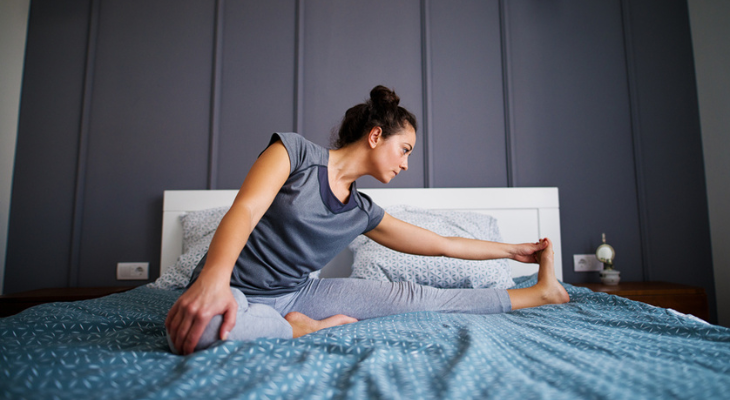
Yoga Could Help You Get a Better Night's Sleep
Do you toss and turn all night? If you have trouble falling asleep or staying asleep, adding a yoga session to your daily routine could offer a simple solution to your sleep problem.
Feeling Stressed? Yoga Will Calm Your Mind
When you feel stressed, several things happen. First, you begin to breathe rapidly while your heart rate rises. At the same time, your muscles tighten, causing headaches and pain and stiffness in your shoulders, upper back and neck.
Pain makes it difficult to fall asleep, but your heart rate also plays a role in sleep. A high heart rate can lengthen the time it takes to fall asleep and affect the quality of your sleep, according to the Sleep Foundation.
During stressful periods, your body increases production of cortisol, a natural chemical known as the stress hormone. Although cortisol helps you react quickly to difficult or dangerous situations, high levels interfere with sleep and can cause health problems ranging from digestive issues to heart disease.
The combination of yoga poses, meditation and yogic (deep) breathing helps you manage stress and improve sleep by:
- Relieving Tension and Stiffness in Your Muscles
- Decreasing Your Heart Rate and Blood Pressure
- Slowing Your Breathing
- Preventing Headaches
- Lowering Your Cortisol Level
- Increasing Production of Serotonin and Endorphins, Hormones That Improve Your Mood and Enhance Relaxation
Yoga Helps You Manage Intrusive Thoughts
Do unwelcome thoughts keep popping in your head when you lay your head on the pillow? Worries about bills, jobs, family issues and your ever-growing to-do list can make it hard to fall asleep. Luckily, you can turn off those thoughts by using the meditation techniques you learned in yoga class.
Meditation involves clearing your mind of and focusing only on the present moment. If a stray thought does cross your mind, you'll take a second to acknowledge it without devoting any emotional energy to it, then return to meditating. With practice, you'll find that it becomes increasingly easier to get rid of the thoughts that keep you up at night.
Deep breathing, another part of your yoga practice, can help you decrease anxiety related to intrusive thoughts. Practice deep breathing by inhaling slowly through your nose, holding your breath for a few seconds, then slowly exhaling through your mouth.
Other Sleep Benefits of Yoga
Yoga also helps you sleep by:
- Extending Slow-Wave Sleep. Slow-wave sleep, the deepest, most restful type of sleep, occurs during the non-rapid eye movement phase of sleep. Unfortunately, the amount of time you spend in this important sleep phase tends to decrease once you reach middle age. Indian researchers report that middle-aged people who practiced yoga and meditation didn't experience a decline in slow-wave sleep, unlike members of the control group.
- Increasing Melatonin Production. Melatonin, a hormone that controls your body's wake-sleep cycle, gradually increases as bedtime approaches. A high cortisol level can affect your melatonin level and cause sleeplessness. Performing yoga not only reduces cortisol but helps balance your melatonin level.
- Reducing Sleep Apnea Symptoms. Sleep apnea causes short breathing pauses that may happen many times during the night. These pauses interfere with sleep, make you feel tired the day, and increase your risk of heart disease, diabetes, high blood pressure, and other health problems. Yoga and yogic breathing strengthen the muscles that help you breathe and regulate your breathing, which may help decrease sleep apnea symptoms.
- Relieving Pain. If pain makes sleeping difficult, yoga offers a drug-free solution. Endorphins produced during yoga sessions act as pain relievers, easing aches, and soreness, naturally.
Although anyone can struggle with sleep issues, the problem is more common in women. Fortunately, yoga may be a better option than taking sleeping aids or drinking warm milk. A systematic review and meta-analysis published in BMC Psychiatry in May 2020 revealed that yoga has a beneficial effect on women's sleep. According to the review, yoga significantly improved sleep quality of women enrolled in 16 randomized control trials.
Wondering if yoga is the answer to your insomnia? We'll help you find the perfect yoga class. Get in touch with us for information about yoga class schedules.
Sources:
Sleep Foundation: What Is a Normal Sleeping Heart Rate?, 3/25/2022
International Journal of Yoga: Sleep, Cognition and Yoga, May - August 2022
